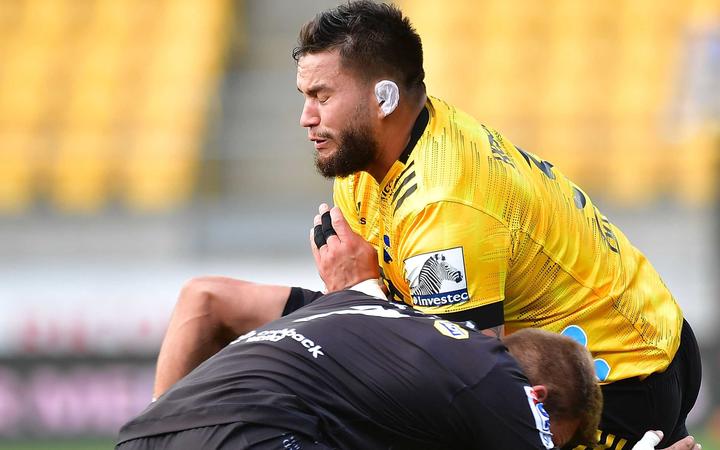Comment: The final whistle might have been blown last weekend on the Southern Hemisphere season. But perhaps the most significant victory didn’t happen until Thursday, when World Rugby decided to open up their eligibility rules.
It’s a travesty that the likes of Ngani Laumape has been lost to test rugby, Jamie Wall writes.
Photo: Photosport
Within seconds, lists of players now available for Pacific Island teams were posted on social media, with plenty of former All Blacks in the mix. It didn’t take much longer for a lot of those players themselves to pledge allegiance to the countries of their heritage.
Some former ABs/Wallabies that COULD play test rugby next year:
Samoa
Julian Savea, Victor Vito, Lima Sopoaga, Francis Saili, Steven Luatua, Henry Speight, Chris Feauia-Sautia, Joe TomaneTonga
Charles Piutau, Israel Folau, Vaea Fifita, George Moala, Augustine Pulu, Sekope Kepu— Tom Vinicombe (@TomVinicombe) November 24, 2021
Lessssgooooooooooooo @NLaumape @CPiutau @StevenLuatua
— Lima Sopoaga (@LimaSopoaga) November 24, 2021
Never say never https://t.co/Jj0pRUZnae
— Julian Savea (@juliansavea7) November 24, 2021
Which is great, as it’s unlikely there are many people in this part of the world who don’t want to see Manu Samoa, Tonga and Fiji get all the help they can get.
The contribution of the Pacific Islands to rugby has not only been massive, but also massively disproportionate, although to simply view it in the well worn narratives of player poaching and financial mismanagement does it a disservice.
It deserves a far more nuanced discussion, but then again so does this entire development. In New Zealand we are very much viewing this through the lens of how beneficial it will be for our neighbours, however it is worth remembering that the Pacific Islands are far from the only test playing nations that the new rules affect.
Firstly, this isn’t actually new. Players switching countries has been a part of rugby for the vast majority of its history, in fact it was still a thing well into the professional era until the ‘Grannygate’ scandal forced a draconian tightening of the rules. Australian-born halfback Des Connor even captained both the Wallabies and All Blacks within a couple of years back in the early 60s.
The rise of then-Western Samoa’s breakthrough run at the 1991 World Cup included several future All Blacks, then eight years later a World Cup game between them and Japan featured five former All Blacks, including Graeme and Stephen Bachop playing on opposing sides. So the proof is there that Manu Samoa will benefit, as the 1990s saw them reach three consecutive World Cup quarterfinals.
However, this new scenario has opened up an interesting situation for players who just happened to be born in foreign countries through circumstance rather than heritage. All Black prop Tyrel Lomax could now potentially play for the Wallabies, having been born in Canberra thanks to his father Johnny’s long career with the Raiders. The same with Akira Ioane, whose birthplace of Tokyo thanks to father Eddie’s rugby career means the door is open for him for a Japanese test spot – although not for brother Rieko. Both can make a switch to Samoa, though.

All Black prop Tyrel Lomax could now potentially play for the Wallabies, having been born in Canberra.
Photo: © Photosport Ltd 2020 www.photosport.nz
The general feeling about any eligibility changes is that the talent would be heading to Tier 2 nations, but it’s explicitly clear that it will be a two-way street. If a young player is capped for a Pacific Island side and then picks up a contract in the UK or France, there is nothing stopping those unions putting a squeeze on them to be made available for their new home if the potential is there.
The wage disparity between teams whenever England hosts a Tier 2 team at Twickenham is already an infamous issue, so a conversation about making £22,000 a game rather than a few hundred dollars is likely to get some attention. So for all the positive talk of former All Blacks helping out the countries of their heritage, this trickle-down system has all the potential to be as exploitative as its economic counterpart.
That remains to be seen, though. As does how it will affect UK rugby internally given the parent and grandparent clause opens up the likes of Scotland’s recruitment capability even wider than it already is. Also it is hard not to feel sorry for Georgia and the South American nations, who have fought hard to get where they are without the ability to tap into any sort of rugby diaspora thus far anyway, and who may now find themselves left in the dust come World Cup time.
But let’s face it; it’s a travesty that the likes of Ngani Laumape, Charles Piutau, Steven Luatua, Malakai Fekitoa and many, many others have been lost to test rugby (although the potential return of one will certainly raise eyebrows for other reasons. That will presumably be fixed soon, hopefully putting an end to the sort of scorelines the All Blacks were putting up earlier this year.
For all the latest Sports News Click Here
For the latest news and updates, follow us on Google News.
